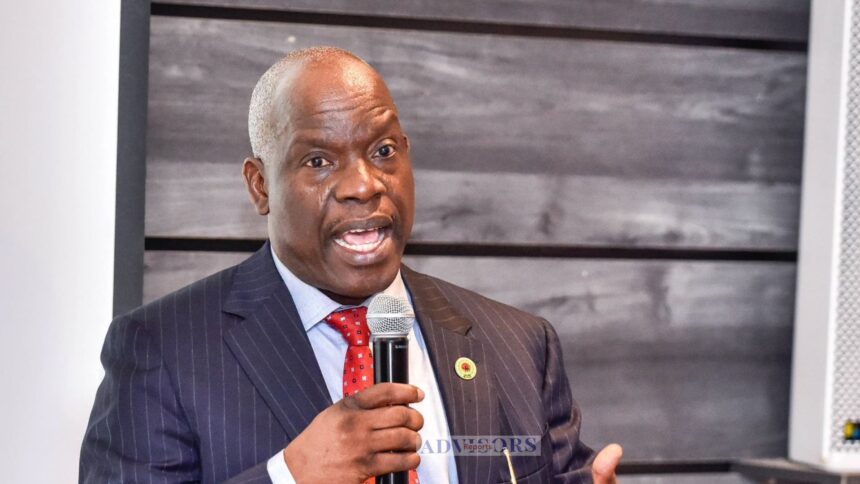… urges SPE, industry groups to tackle manpower gaps for future energy demands
Oredola Adeola
Engr. Gbenga Komolafe, Commission Chief Executive of the Nigerian Upstream Petroleum Regulatory Commission (NUPRC), has noted that equipping the next generation of energy professionals is critical to sustaining Nigeria’s competitiveness and achieving long-term energy security.
He has therefore challenged the Society of Petroleum Engineers (SPE) and other industry associations to rise to the challenge of addressing manpower shortages in the oil and gas sector.
The CCE stated this during his keynote at the opening ceremony of the 48th Nigeria Annual International Conference and Exhibition (NAICE 2025), organised by the Society of Petroleum Engineers (SPE) on Monday.
Speaking on the conference theme, “Building a Sustainable Energy Future: Leveraging Technology, Supply Chain, Human Resources and Policy,” Engr. Gbenga Komolafe, Commission Chief Executive of the Nigerian Upstream Petroleum Regulatory Commission (NUPRC), underscored the urgent need for targeted capacity-building and increased engagement with young professionals to reposition Nigeria’s upstream industry in line with the fast-evolving global energy landscape.
He noted that the theme “captures the critical elements that must converge for the upstream sector to remain viable and aligned with global trends.”
The CCE explained that the NUPRC outlined several initiatives focused on integrating decarbonisation measures into field development, facility engineering, and production operations, aimed at supporting sustainability across the sector.
“As the Upstream Industry regulator, our responsibility goes beyond compliance,” Komolafe stated.
“We are focused on enabling a stable, efficient, and forward-looking upstream sector, one that balances the imperatives of energy security, environmental responsibility, and economic sustainability.”
He emphasised that “Technology is central to enabling a dynamic and vibrant industry. We are witnessing a shift in exploration, development, and production methods anchored on technological transformation.”
Komolafe further noted that the Commission is promoting the adoption of innovative technologies in Exploration & Production activities, including approaches for decarbonisation and emissions reduction.
“By the same token, the NUPRC has embraced technology in its regulatory operations to enhance service delivery, improve turnaround time, and rejig its business process.
“These are not just technical upgrades; they are part of our broader effort to entrench transparency, promote accountability, and reduce costs, all geared towards enabling industry growth and vitality,” the CCE said.
He also stressed the critical role of a resilient supply chain in enhancing operational efficiency and boosting national capacity.
According to him, “We have taken deliberate steps to create a regulatory environment that supports the growth of service companies, both international and indigenous.
“Our approach to regulatory enablement is geared towards domestication of technology, promoting local manufacturing, and enhancing overall supply chain resilience,” he said.
On workforce development, Engr. Komolafe described “Human capital [as] the most valuable asset of our industry,” adding that the Commission continues to partner with academic institutions, professional bodies, and training providers to advance skills and technical excellence, especially in light of the global shift toward a low-carbon future.
“These instruments demonstrate our commitment to creating a regulatory environment that fosters innovation, secures long-term value, and ensures the responsible stewardship of Nigeria’s upstream resources,” he added.
Beyond regulatory frameworks, Komolafe highlighted the Commission’s ongoing initiatives to boost oil production. He reported progress under the Project 1 MMBOPD Incremental Initiative, made possible through a multi-stakeholder collaborative approach.
According to him, Nigeria has surpassed 1.8 million barrels of oil per day (MMBOPD) at peak production in July, with an average production of 1.78 MMBOPD.
He explained that the Commission is optimising the Maximum Efficient Rate (MER) framework, managing produced water effectively, and aligning maintenance schedules to minimise disruptions.
“Given the above and with the concerted efforts of all, the Presidential mandate on production increase is well within reach.
“We call on all operators to collaborate with us as we incorporate decarbonisation measures in Field Development, Facility Engineering, and Production Operations to accrue the afore-mentioned benefits,” Komolafe stated.
The CCE therefore noted that “building a sustainable energy future will demand trade-offs, innovation, and coordinated effort.”




